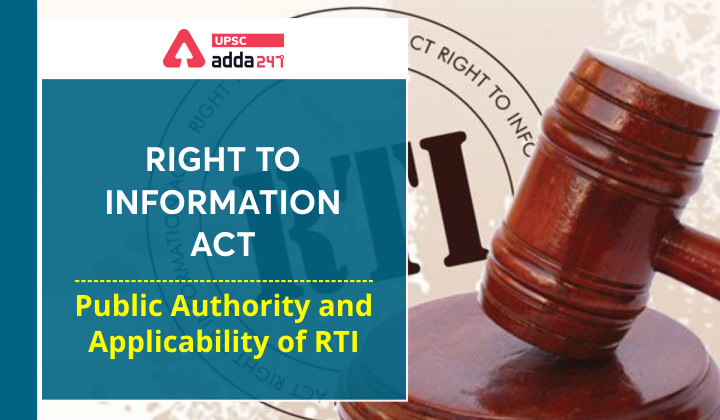Table of Contents
The Right to Information Act- Relevance for UPSC Exam
- GS Paper 2: Important aspects of governance– Citizens charters, transparency & accountability and institutional and other measures.
The Right to Information Act- Background
- The Right to Information Act is a revolutionary Act that aims to promote transparency in government institutions in India.
- The Right to Information Act came into existence in 2005, after sustained efforts of anti-corruption activists.
- We have already discussed the key concept of the Right to Information Act, historical background and its objectives and Key Provisions of the RTI Act.
- In this article, we will discuss what is a public authority, the Time period for responding to RTI applications, and also its Applicability.
The Right to Information Act- Public Authority
- Section 2(j) of the RTI Act 2005, defines the “Right to Information” accessible under this Act which is held by or under the control of any public authority.
- In this context, Public Authority means any authority or body or institution of self-government established or constituted-
- By or under the Constitution;
- By any other law made by Parliament/State Legislature.
- By notification issued or order made by the appropriate Government, and includes any-
- Body owned, controlled or substantially financed;
- Non-Government organizations, substantially financed, directly or indirectly by funds provided by the appropriate Government.
Fill this form to get free Study Material of UPSC ESIC Deputy Director
The Right to Information Act- Applicability of RTI
- Private Entities: Though Private entities, in general, do not come under the jurisdiction of RTI Act 2005 but privatized public utility companies fall within its purview as reaffirmed by the Central Information Commission in Sarbjit roy vs Delhi Electricity Regulatory Commission case.
- Political parties: currently, no political party has accepted the jurisdiction of RTI Act.
- Previously, the Central Information Commission (CIC) had held that the political parties are public authorities and are answerable to citizens under the RTI Act.
- To nullify this, the central government introduced a Right to Information (Amendment) Bill 2013 which would remove political parties from the scope of the law.
- Currently, the matter is sub judice in the Supreme Court.
- Chief Justice of India: The Supreme Court upheld the decision of Delhi High Court, bringing the office of Chief Justice of India under the purview of Right to Information (RTI) Act.




 TSPSC Group 1 Question Paper 2024, Downl...
TSPSC Group 1 Question Paper 2024, Downl...
 TSPSC Group 1 Answer key 2024 Out, Downl...
TSPSC Group 1 Answer key 2024 Out, Downl...
 UPSC Prelims 2024 Question Paper, Downlo...
UPSC Prelims 2024 Question Paper, Downlo...





